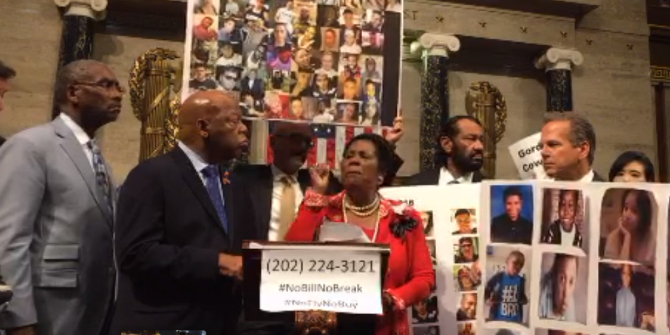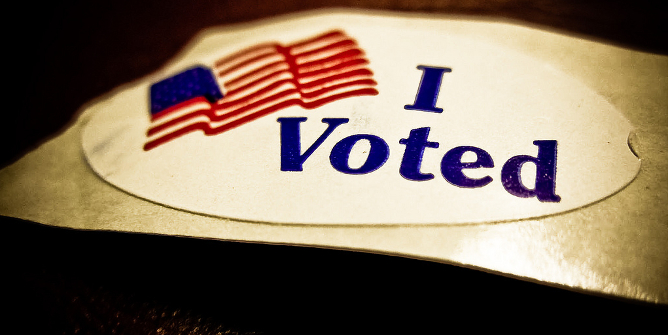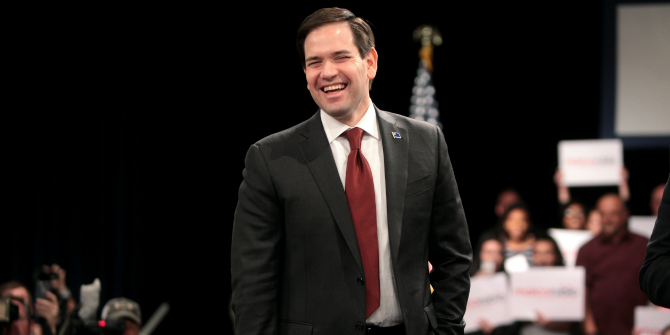 In the first article in our new series covering key Senate races in the 2016 election cycle, Rolda Darlington takes a close look at the race between the incumbent Republican Marco Rubio and Democrat Patrick Murphy. She writes that despite Murphy’s apparent talent for career politics, Rubio looks set to win an election that will have important implications for how the next president governs- whoever they may be.
In the first article in our new series covering key Senate races in the 2016 election cycle, Rolda Darlington takes a close look at the race between the incumbent Republican Marco Rubio and Democrat Patrick Murphy. She writes that despite Murphy’s apparent talent for career politics, Rubio looks set to win an election that will have important implications for how the next president governs- whoever they may be.
This week the Congressional primary season came to an end as Delaware, New Hampshire, New York, and Rhode Island voters went to the polls to cast their ballots. It has been a contentious and arduous primary season in 2016, not made any easier by the impending Presidential election. One state that remains on the radar, for a number of reasons, is Florida, which held its primary elections on August 30th. In that election, Florida voters cast their lots for who would compete for the upcoming Senate race. In what is expected to be one of the nation’s most expensive Senate races this year, the victorious contenders, representing the Republican and Democratic parties were Marco Rubio and Patrick Murphy, respectively. Florida’s Senate race is one of the nine competitive battleground races, which could determine which party controls the upper chamber of Congress after the November election.
Incumbent Republican Senator Marco Rubio made the decision to run to hold on to his seat after what seemed like much kicking and screaming. After his crushing loss in the Republican Presidential primary race earlier this year, he declared that he would end his political career and transition into civilian life. It came at no shock to observant voters, however, when Rubio changed his mind, entered the Senate race, and went on to endorse the Republican candidate for President, Donald Trump. Patrick Murphy became Florida’s Democratic candidate for the US Senate with far less fanfare and performance art. He currently serves as US Representative in Florida’s 18th congressional district, and recently competed in the Florida Democratic primary race against an embattled and beleaguered Alan Grayson of Florida’s 9th congressional district. Making his electoral ambitions known during his second term as one of Florida’s representatives, Murphy took on his opponents as a candidate with little name recognition, but with relatively high voter support.
The race, as it stands now, comes down to incumbent Senator Marco Rubio (R-FL), Representative Patrick Murphy, and let us not forget the third party competitors, including, Paul Stanton (L), and nine Independent and write-in candidates. But how is the race unfolding, and what might it mean for the presidential race?
Senator Marco Rubio hardly needs any introduction, even for non-Floridians. Rubio burst on to the national stage as a candidate for the Republican Party’s nomination for President in April 2015. He first lost the primary in his own state, and then went on to lose a hard-fought battle for the nomination to the party’s eventual nominee, billionaire Donald Trump. Opinions are mixed concerning just why Rubio’s bid for the nomination was unsuccessful, but they are far-reaching. Some political analysts offer that Rubio failed to appeal to enough Hispanic voters to move the electoral needle in his favor and propel him past his competition. Others dismissed identity politics and used Rubio’s poor attendance on the Senate floor and his relatively limited legislative accomplishments as reasons for his failed attempt at the nomination. Whatever may come to be revealed as the most significant reason for his loss in the primaries, once he lost, his future in politics was tenuous at best. It is now a commonly-peddled narrative that Rubio has returned to fight for his Senate seat to better position himself for another Presidential bid in 2020. After all, he has not pledged to fulfill his entire six year obligation if he wins reelection to the Senate seat he is running to keep. Speculations on his motivation aside, Rubio’s Senate seat is extremely important for the Republican Party that ultimately hopes to maintain its majority in the Senate.
Rubio was first elected in 2010 on the wings of a Tea Party surge which would come to define much of the Congress ushered in for that midterm election. He essentially left his post as Senator of Florida to go on the campaign trail for the Presidential nomination last year, opening the door for allegations from dissenters of abandonment. He is cited as having the lowest attendance in US Senate history, a charge his challenger does not make lightly. Murphy has accused Rubio of missing Senate votes and abandoning Florida voters for his Presidential run, saying in an interview that Sen. Rubio has the worst vote attendance rate of any Florida Senator in 50 years. As the general election approaches, Rubio is spending a considerable amount of time taking up the cause for Zika funding that looms on the Senate agenda.

Rep. Patrick Murphy is best served when launching these charges against his opponent. Murphy continues to field a number of charges from Rubio’s camp. Murphy was elected to his seat as US Representative from the 18th district of Florida in 2012, and then again in 2014. He won his 2012 election against Republican Allen West by 0.8 percent in what has come to be the most expensive race in US House history. Despite his district’s slight Republican lean, Murphy won reelection by 60 percent in the following cycle. When it comes down to it, Murphy simply does not have an extensive history in elected politics. Much of that may have something to do with the fact that he is 33 years old and graduated with his Bachelor’s degree from the University of Miami as recently as 2006. A native of Miami, Murphy was a construction executive and accountant before running for the US House of Representatives in 2012, amassing substantial wealth in the short tenure between careers. His significant victory in the 2014 election seemed to indicate the political youngster’s talent for career politics. The November election may come to tell us otherwise.
Despite all of the routinized mud-slinging that is a part of the Florida Senate race, one candidate has managed to consistently be at the top of the polls. Hovering at around 50 percent to his challenger’s 43 percent, Rubio is holding what is being called a solid lead. This Quinnipiac University poll, conducted between August 31 and September 7th, puts Rubio on top with a 4 point margin of error. A PPP poll conducted from September 4 – 6 looked a little less secure for Rubio, reporting him at 40 percent to Murphy’s 37 percent (+/- 3.6 percent). Regardless of which poll one chooses to follow, it is commonly believed that Marco Rubio will win his reelection bid in November. This prediction comes with a significant amount of pressure for both the candidate and the Republican Party. As mentioned earlier, the Florida Senate race is of particular importance for the Republican Party, as the party currently has the majority in both chambers of Congress. Depending on who clinches the White House in November, a conclusion that vacillates between Hillary Clinton and Donald Trump among the various national polls, the result of the Florida Senate race portends vastly different outcomes for the future of US politics.
If the Democrats win the White House and Rubio is able to hold on to his seat, then his seat represents one less vote in the Senate for a potential Supreme Court nominee. On the other hand, if Donald Trump and the Republicans make it to the White House, it can be expected that Rubio’s seat will be a notch for the Republican’s reign over the Executive and Legislative branches. Considering the Supreme Court’s current vacancy, which leaves the branch one Justice short, a maintained Republican majority will have lasting consequences.
To be sure, the Florida Senate race is not the most important one to look out for in the coming general election. Nine states are holding Senate elections that have been classified as “battleground” elections. These Class 3 Senate races are closer in the polls than expected, and the Republican Party is desperate to hold on to every one of these seats to maintain their majority. In New Hampshire, for example, Sen. Kelly Ayotte is in the fight of her political life to hold on to her Senate seat against a formidable foe in the form of Governor Maggie Hassan. The most recent Realclearpolitics poll has Ayotte in the lead, but this has not always been the case in this highly competitive race. In Wisconsin, the story for Republicans is even more uncertain in that Senator Ron Johnson has been called the most vulnerable incumbent of the nine battleground 2016 Senatorial elections. Former Wisconsin Senator Russ Feingold is fighting his way back into the seat he lost in the 2010 Senate election, and he is having some success.
Relatively speaking, the Florida race between Marco Rubio and Patrick Murphy is not at the top of the Republican’s worry list among tough races, but its significance for the Republican Party and its quest to maintain its majority in the Senate still remains. The Republican Party is counting on Rubio’s win as much as they may be counting on wins from seven other Republican incumbents in Battleground Senate races. Nevada is the only state facing a battleground Senate election with a Democratic incumbent, Senate minority leader, Harry Reid. Rubio may be maintaining a lead for now, allowing his party a temporary sigh of relief, but a loss in Florida would be devastating for the Republican Party, nonetheless.
Alas, a conversation about congressional elections is not complete unless a discussion is held concerning the impact the Presidential race has on the fate of the Senators up for reelection. How Presidential elections affect down-ticket elections is not a precise science, but Marco Rubio’s fate in the Florida Senate race will undoubtedly be affected by the happenings of the Clinton/Trump saga. Whether that effect will be in Rubio’s favor or in Murphy’s favor is yet to be determined. What we know now is that the result of the 2016 Florida Senate election may have a lasting and important impact on American politics for the foreseeable future.
Featured image credit: Gage Skidmore (Flickr, CC-BY-SA-2.0)
Please read our comments policy before commenting.
Note: This article gives the views of the author, and not the position of USApp– American Politics and Policy, nor of the London School of Economics.
Shortened URL for this post: http://bit.ly/2cZFBLC
_________________________________
 Rolda Darlington – University of Florida
Rolda Darlington – University of Florida
Rolda Darlington is a PhD student at the University of Florida. Her research interests include minority and gender politics, Congressional studies, American institutions, civic education and participation, and Democratic Representation.






